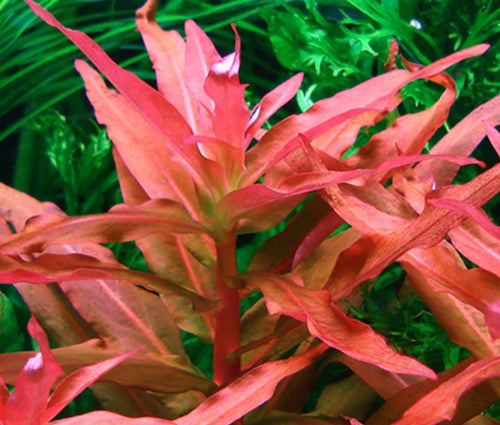Ammania Gracilis In vitro
> Colorful stem plant
> Narrow, 7 to 12 cm long leaves
> Upright growth habit
For many years, Ammannia gracilis is known in the aquarium hobby as one of the most colorful stem plants. It is often falsely labeled Nesaea crassicaulis (Ammannia crassicaulis) in trade. True Ammannia crassicaulis is a similar species that gets only yellowish green to reddish under water, not as red as A. gracilis, however it is probably a very rare aquarium plant. A. gracilis is native to West Africa (Senegambia) where it occurs as wetland plant in full sun, at sandy riverbanks and in floodplains. The plant is able to grow above and under water. In its terrestrial form its leaves are inconspicuously green. However it develops its up to 12 cm long submerged leaves when it is under water. The upper side of the leaves is brown-red, the lower side deeply violet.
The Red Ammannia is one of the most demanding aquarium plants. It should get a lot of light; complete macro- and micronutrient supply, also via the bottom, is important. Rather soft water is beneficial, but with CO2 addition the plant also thrives in medium hard water. It prefers higher temperatures above 24 °C and still tolerates 32 °C. Several stems of different length should be planted into the ground with some space to each other. As well as other stem plants, this Ammannia is propagated by cuttings of the stem tip and side shoots.
With its broad shoots and splendid brown-red coloration, the Red Ammannia looks best as a group in the midground of larger aquariums. It is well suited for creating "plant streets" in Dutch style tanks. Ammannia gracilis may also be interesting for open tanks because it readily grows out of the water. Strong lighting provided, one can expect its little light purple flowers.
Ammannia gracilis originates from swampy areas in West Africa. The first specimens of the African hygro were brought into the hobby by aquarist P. J. Bussink who found them in Liberia. Ammania gracilis is probably the most popular of the genus due to its beauty and its moderate requirements.
Although A. gracilis may be an uncomplicated stem plant, it only shows its full potential under strong lights; moreover, it needs sufficient amounts of CO2 (25-30 mg/l). It prefers soft and slightly acidic water, but adapts well to more extreme water parameters. Nitrate and phosphate should be added to the tank, as well as iron and other micronutrients. A lack of iron shows in fading leaf color, whereas too ample a provision leads to longer stems and a less intensive red (a high nitrate content also leads to the leaves turning green). A. gracilis shows its most intensive coloration when nitrates are low and, at the same time, the content of phosphate and micronutrients is high.
When kept under good conditions, this large, colorful stem plant soon grows to the water surface. If you cut the upper part with a pair of scissors and replant it you get robust, beautiful African hygro plants. A. gracilis can also be propagated by cutting off its lateral shoots which are then replanted.
Its size makes A. gracilis a plant for the middle area or the background of aquaria with a volume of over 76 liters, where its cognac-colored hues contrast beautifully against bright green plants like e.g. Heteranthera zosterifolia.


















